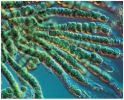Neurologically poisonous organisms take over Murray Darling river system

 Entirely predictably, the Murray Darling river system is toxic with effluent again, host to masses of poisonous cyanobacteria. As the Weekly Times reports, "WATER will be switched off to hundreds of farmers and town residents in the Mallee this week as the Murray River blue-green algae emergency worsens. The toxic outbreak now involves almost 500km of the Murray River and has claimed reservoirs, rivers, wetlands and parts of Victoria’s two biggest irrigation districts. Taps were turned off to towns and farms in parts of the southern Mallee late Friday when the algal bloom reached key Wimmera Mallee pipeline pumps near Swan Hill, catching most residents unaware. Experts said a record autumn heatwave, with temperatures soaring above 40C in northwest Victoria this week, was expected to grow the algal bloom until it choked almost all of the Murray River along the NSW-Victoria border within weeks."[1] But these problems have been known for so long now, it seems foolish to believe that we can hope for any resolution that would keep the vast Australian desert from claiming on our only major inland river system. Certainly we should not meddle with the northern river systems, but unfortunately our psychopathic leaders have already started.
Entirely predictably, the Murray Darling river system is toxic with effluent again, host to masses of poisonous cyanobacteria. As the Weekly Times reports, "WATER will be switched off to hundreds of farmers and town residents in the Mallee this week as the Murray River blue-green algae emergency worsens. The toxic outbreak now involves almost 500km of the Murray River and has claimed reservoirs, rivers, wetlands and parts of Victoria’s two biggest irrigation districts. Taps were turned off to towns and farms in parts of the southern Mallee late Friday when the algal bloom reached key Wimmera Mallee pipeline pumps near Swan Hill, catching most residents unaware. Experts said a record autumn heatwave, with temperatures soaring above 40C in northwest Victoria this week, was expected to grow the algal bloom until it choked almost all of the Murray River along the NSW-Victoria border within weeks."[1] But these problems have been known for so long now, it seems foolish to believe that we can hope for any resolution that would keep the vast Australian desert from claiming on our only major inland river system. Certainly we should not meddle with the northern river systems, but unfortunately our psychopathic leaders have already started.

People have asked me to republish a letter written in 1937 about this very problem. I have done so below, but if you really want to understand the horror of this phenomenon, get hold of a copy of Rodney Barker's tale of a scientist trying to blow the whistle on the pfisteria infestation on the Mississipi in the mid 1990s and probably still today. There and here it is the product of too much fertiliser and effluent going into too little water. This is among the best pieces of science writing I have ever read. The life-forms that toxic algae take and their ability to affect the nervous systems of animals large and small - notably humans and baby humans - outdoes the monster from the Black Lagoon and is very very real and very little recognised.
Russell Grimwade urges National Awakening in 1937 - but we are sleeping even more deeply today
Letter to the editor of the Argus Newspaper, 6 February 1937: Sir. - Your leading article "Nature Takes Revenge" in the Issue of Saturday is a valuable history of man's expansion to the outer continents from Europe. It states the basic laws under which man is allowed by Nature to add to his wealth and comfort. It also states the inevitable disaster that follows the contravention of these laws. The final sentence leaves the way open for constructive action in a manner which impels me to contribute a suggestion for the urgent consideration of my fellow Australians.
This isolated continent is the most recent of the earth's land masses to suffer the occupancy of civilised man. It is undeniable that in the century and a half that we and our antecedents have been here we have made a success of it - if success be measured by material and social progress. It is also undeniable that we have a duty to leave our
successors as good or a better land than we have enjoyed. If we do not learn by the mistakes that time is now revealing in other countries we are falling in our trust. The repeated stories of floods and disaster that come to us from .America are clear evidence of the errors of the systems of occupation of a few centuries ago. Are we yet taking action
to avoid those mistakes?
There is ample evidence that we are not.
Erosion, flood, and soil drift are three terrors alone that we are beginning to experience in the same way as other countries of comparatively recent settlement. To avoid these disasters, are we taking all the action possible that trained men recommend?
It is a sad fact that we are not.
There has been a remarkable growth this century in the universal education of our people in regard to the value and functions of trees and forests. But it is incomplete, and has not yet led to the necessary political action to safeguard the future.
Do Australians realise what uncontrolled settlement has done to their great river, the Murray?
Ninety years ago 51 per cent of its annual flow came down in winter months and 49 per cent in summer. Today 76 per cent is winter flow and 24 per cent, summer.
This is a unique illustration of the regulating value of forest-clad watersheds. Do Australians know that, since the Burrinjuck dam was finished, 12,000,000 cubic feet of silt has accumulated in it? Do the taxpayers who have built the Hume weir realise that only half its watershed is under control, and that the other half, in private ownership, may be cleared and burnt as cleanly as its owners wish, and that such operations must inevitably hasten the silting up of the huge lake, so that perhaps in 100 years it will not exist and cannot be remade? Do Australians realise that settlement in all States has taken place, and is still taking place, under Lands departments which dominate the trained officers of the Forests departments?
Do Australians realise that the chief product of their forests is not the lovely timber that they yield, but water and its regulation, which is the factor limiting the immediate population and future prosperity of their continent? ? Is it known that each year trained forest officers make an analysis of the causes of the fires that occur in our forests, and
that each year they report that more than half of them are caused deliberately? It is known by every interested party that for a few thousand pounds collected each year by Lands departments, holders of grazing licences or their agents, or their delayed-action candles, cause fires that burn out mountain sides of perfect watershed in return for precarious grazing for a few head of cattle.
Do Australians mind? Do they wish to save these appalling yearly losses and attain a balance that will prolong the future indefinitely in progress, prosperity, and peace from flood, fire, and denudation? If they do wish these things, much can be done to that end, but it must be done in the next few years. In a few more years it will be too late.
The first thing to be done is political. Let each State that wishes to ensure its future place all its Crown lands under the absolute control of its Forests Department. Let the forest officers of the State-men who are trained in the great fundamental science of forestry be the only authority who shall say what is to go on in those areas, and who shall enter them.
If tourists, graziers, settlers, or even Lands Department officers want access to those areas, let it be only with the approval of the Minister for Forests on the recommendation of
his experts.
This is the obvious first step to avoid the appalling mistakes that other countries have made and this country is still making. Such a step is above the factions of party politics, and far above the feelings and jealousies of departmental officers. It is no censure on Lands departments that the administration of Crown lands should be removed from their control. It is an archaism that they should so remain.
When Lands departments were given control of Crown lands the great science of forestry had not formulated the laws that govern the fundamental requirements of modern national life. For example, the urban consumption of water has Increased tenfold a head in the last 100 years, and cities are larger, and likely to become larger and even more extravagant. It is only by the application of the principles of sound forestry that supplies of the necessary volume will be available to the population this country may be called upon to sustain. It is no shame upon Lands Department officers that they have not the expert knowledge to provide these requirements. It is not their job.
It is shame upon us that we allow, by an inverted system of administration, the experts to be subservient to the layman. Should this change be wrought by public clamour or far-seeing governmental action, I believe that within 10 years the fire-loss alone would be so reduced that the people of our country would be encouraged to feel that the awful damage of the past was being reclaimed, and that Australia was doing something to reclaim the unrelenting desert creep that threatens us today.
Russell Grimwade, 6 February 1937.
NOTES
The introduction to this article cited from Chris McLennan, "Water crisis worsens as Murray River blue-green algae spreads," Weekly Times
March 8, 2016

Recent comments